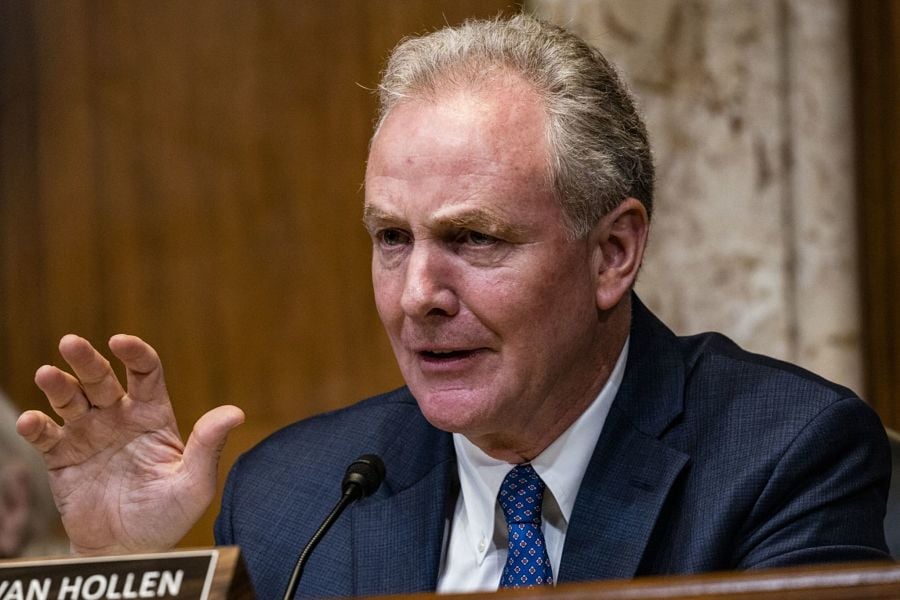

A Senate author of bills to impose new taxes on the wealthy and those inheriting assets said the ideas are popular with the public but hesitated to predict Wednesday whether they will be adopted in a massive spending bill working its way through Congress.
Sen. Chris Van Hollen, D-Md., earlier this year introduced legislation that would assess a 10% surtax on individuals making more than $1 million and households making more than $2 million. The levy would apply to earned and investment income in excess of those thresholds.
He also introduced a bill that would establish a tax on unrealized capital gains for inherited assets, ending the so-called stepped-up basis for heirs.
The tax reform proposals could be considered by Senate and House tax committees over the next couple weeks as they write legislation to enact Biden administration priorities in a $3.5 trillion budget bill.
The budget legislation, which would fund a wide range of social and climate spending programs, is being advanced under a parliamentary rule called reconciliation that sidesteps a Senate filibuster.
All 50 Senate Democrats must support the bill for it to be approved by virtue of Vice President Kamala Harris’ tie-breaking vote in a chamber that is evenly split between Democrats and Republicans.
Van Hollen, a member of the Senate banking, budget and appropriations committees, is not sure whether all of his 49 Senate Democratic colleagues are on board with his tax proposals, but he is confident ordinary Americans are.
“It would be hard for me at this point to say which have a higher chance of success than others,” Van Hollen said during a webinar sponsored by the Center for American Progress, a left-leaning Washington policy organization. “I will say when the public is presented with a fair description of these proposals, they overwhelmingly support it.”
Implementing the millionaires’ surcharge and ending stepped-up basis not only would help raise revenue to pay for the spending in the $3.5 trillion budget reconciliation, it also would ensure the wealthy pay their fair share of taxes, Van Hollen said.
“As we go forward, these are all things that will increase the equity of our tax system and will be … very politically and publicly popular,” he said.
For instance, Van Hollen asserted it’s important for the wealthy to pay taxes on their income and investments.
“Very high-income individuals make a lot of their money off of money rather than off of their labor,” he said. “It’s important that we have a tax system that doesn’t treat folks who make money off of money more favorably than those who are going out and working through sweat and labor every day.”
Eliminating stepped-up basis would end a tax break that mostly benefits the wealthy, Van Hollen said.
“This current loophole in our law is really what has given rise to the American aristocracy, where people can pass on that unearned wealth from one generation to the next,” Van Hollen said. “This is a massive loophole for the super, super wealthy.”
Stepped-up basis would not apply to the first $1 million in capital gains on inherited assets and family farms and small businesses would be protected under his proposal, Van Hollen said.
Republicans are united in opposing the budget reconciliation bill not only because of the price tag but also because of the taxes that would fund it.
Sen. John Thune, R-S.D., has ripped the stepped-up basis proposal.
“[I]f your parents’ house or the family farm or other assets have increased in value more than Democrats deem desirable, you would now owe capital gains taxes on the amount of that increase immediately after your parents’ death, minus the amount Democrats choose to exempt,” Thune, the second-ranking Senate Republican, said recently on the Senate floor. “And there are plenty of middle-class Americans around this country who would be paying this tax.”
Whether Van Hollen’s proposal makes it into the budget reconciliation bill depends on support from moderate Democrats, such as Sens. Joe Manchin, D-W.Va., Kyrsten Sinema, D-Ariz., and Jon Tester, D-Mont.
Editor’s note: This story has been corrected to indicate there is a $1 million exemption in Sen. Van Hollen’s stepped-up basis legislation.

While industry statistics pointing to a succession crisis can cause alarm, advisor-owners should be free to consider a middle path between staying solo and catching the surging wave of M&A.

New joint research by T. Rowe Price, MIT, and Stanford University finds more diverse asset allocations among older participants.

With its asset pipeline bursting past $13 billion, Farther is looking to build more momentum with three new managing directors.

A Department of Labor proposal to scrap a regulatory provision under ERISA could create uncertainty for fiduciaries, the trade association argues.

"We continue to feel confident about our ability to capture 90%," LPL CEO Rich Steinmeier told analysts during the firm's 2nd quarter earnings call.
Orion's Tom Wilson on delivering coordinated, high-touch service in a world where returns alone no longer set you apart.
Barely a decade old, registered index-linked annuities have quickly surged in popularity, thanks to their unique blend of protection and growth potential—an appealing option for investors looking to chart a steadier course through today's choppy market waters, says Myles Lambert, Brighthouse Financial.
